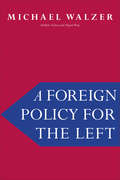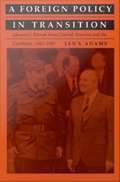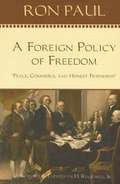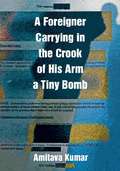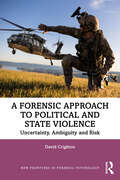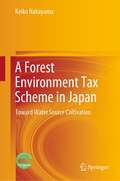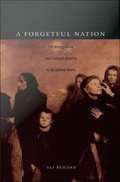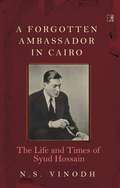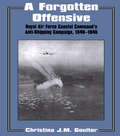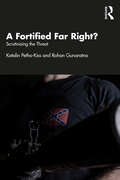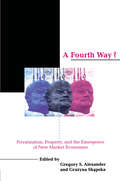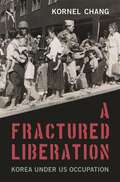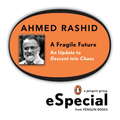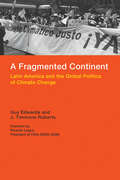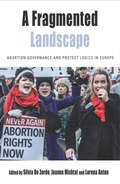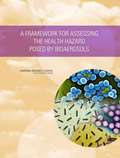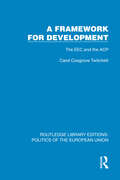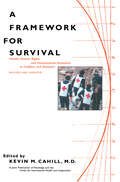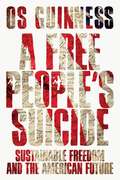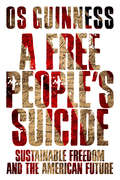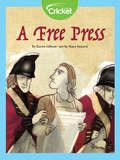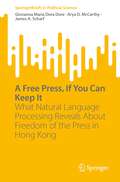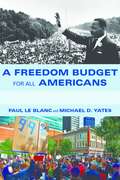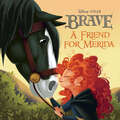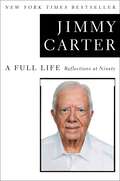- Table View
- List View
A Foreign Policy for the Left
by Michael WalzerSomething that has been needed for decades: a leftist foreign policy with a clear moral basis Foreign policy, for leftists, used to be relatively simple. They were for the breakdown of capitalism and its replacement with a centrally planned economy. They were for the workers against the moneyed interests and for colonized peoples against imperial (Western) powers. But these easy substitutes for thought are becoming increasingly difficult. Neo-liberal capitalism is triumphant, and the workers’ movement is in radical decline. National liberation movements have produced new oppressions. A reflexive anti-imperialist politics can turn leftists into apologists for morally abhorrent groups. In Michael Walzer’s view, the left can no longer (in fact, could never) take automatic positions but must proceed from clearly articulated moral principles. In this book, adapted from essays published in Dissent, Walzer asks how leftists should think about the international scene—about humanitarian intervention and world government, about global inequality and religious extremism—in light of a coherent set of underlying political values.
A Foreign Policy in Transition: Moscow's Retreat from Central America and the Caribbean 1985-1992
by Jan S. AdamsDuring his years of leadership in the Soviet Union, Mikhail Gorbachev initiated revolutionary changes in that country's foreign and domestic policies. A Foreign Policy in Transition charts the changing Soviet policies toward Central America and the Caribbean during the Gorbachev years, examines the effects of these policies on individual countries, and looks to the role that Russia and the other Soviet-successor states will play in this region in the 1990s. Jan S. Adams analyzes the factors shaping Gorbachev's foreign policy in Central America by surveying Soviet political views old and new, by describing Gorbachev's bold restructuring of the Soviet foreign policy establishment, and by assessing the implications of his policy of perestroika. A series of country studies demonstrates how changes in Soviet policies and domestic and economic circumstances contributed to significant shifts in the internal conditions and external relations of the Central American and Caribbean nations. Adams discusses in detail such topics as the reduction of Soviet military and economic aid to the region and pressures exerted by Moscow on client states to effect the settlement of regional conflicts by political rather than military means. The author concludes by speculating about which trends in foreign policy by Russia and other Soviet-successor states toward Central America and the Caribbean may persist in the post-Soviet period, discussing as the implications of these changes for future U. S. policy in the region.
A Foreign Policy of Freedom, Peace, Commerce, and Honest Friendship
by Ron PaulRon Paul is a true maverick in the House of Representatives. He has consistantly spoken out against our use of troops overseas: Lebanon, Samolia and Iraq, just to name a few. He makes a good case for avoiding foreign conflicts.
A Foreigner Carrying in the Crook of His Arm a Tiny Bomb
by Amitava KumarPart reportage and part protest, A Foreigner Carrying in the Crook of His Arm a Tiny Bomb is an inquiry into the cultural logic and global repercussions of the war on terror. At its center are two men convicted in U.S. courts on terrorism-related charges: Hemant Lakhani, a seventy-year-old tried for attempting to sell a fake missile to an FBI informant, and Shahawar Matin Siraj, baited by the New York Police Department into a conspiracy to bomb a subway. Lakhani and Siraj were caught through questionable sting operations involving paid informants; both men received lengthy jail sentences. Their convictions were celebrated as major victories in the war on terror. In Amitava Kumar's riveting account of their cases, Lakhani and Siraj emerge as epic bunglers, and the U.S. government as the creator of terror suspects to prosecute. Kumar analyzed the trial transcripts and media coverage, and he interviewed Lakhani, Siraj, their families, and their lawyers. Juxtaposing such stories of entrapment in the United States with narratives from India, another site of multiple terror attacks and state crackdowns, Kumar explores the harrowing experiences of ordinary people entangled in the war on terror. He also considers the fierce critiques of post-9/11 surveillance and security regimes by soldiers and torture victims, as well as artists and writers, including Coco Fusco, Paul Shambroom, and Arundhati Roy.
A Forensic Approach to Political and State Violence: Uncertainty, Ambiguity and Risk (New Frontiers in Forensic Psychology)
by David CrightonA Forensic Approach to Political and State Violence applies a forensic lens to the study of risk in relation to political and state violence.Divided into three parts, the book outlines the nature and function of political and state violence and the historic development of contributions from forensic practice. It then considers the distinction between political and state violence and the foundations for this. This is followed by a review of developments of current research and practice looking at future development and the ways in which forensic practice might more effectively contribute to risk reduction and management. The text will argue that the basis of much current forensic practice, in relation to political and state violence, is unduly limited and has failed to integrate relevant scientific research into practice. The role of market-led approaches to work in these areas will also be considered, in relation to the way this has influenced and distorted practice and delayed progress. Drawing on theories derived from psychology and other areas of research, the book considers how evidence might inform improvements, using the risks and uncertainties that surround politically motivated violence to illustrate this. Real cases of political and state violence are considered, with topics including military conflict, terrorism, use of torture and hostage taking to highlight current failings and weaknesses. Barriers to implementing better forensic practice in terms of both professional, economic and policy interests are also explored.It will be an essential read for all students or practitioners in the areas of forensic psychology, criminal justice or violence risk management.
A Forest Environment Tax Scheme in Japan: Toward Water Source Cultivation
by Keiko NakayamaThis book is a work that focuses on the forest environmental tax. Forest resources have played a major role in preventing global warming by absorbing carbon dioxide and supplying oxygen. However, global economic growth has adversely affected the global environment and has exacerbated global warming due to excessive consumption of forest resources. The functions or “services” of forests are diverse, but the interest of the citizenry in forest cultivation is scarce since forests are public goods. Concurrently, Japanese forestry, which has played an important role in forest conservation, is steadily declining, and it is no longer possible for private forest operators to maintain the forest environment. Therefore, in order to realize sustainable economic growth, it is necessary to formulate policies for the conservation of appropriate forest environments. Forest conservation is an especially important policy issue for Japan, where two-thirds of the country is forested. In Japan, a forest environmental tax is being introduced as a forest conservation policy. As of 2021, the forest environmental tax has already been introduced in about two-thirds of the prefectures and soon will be introduced as a national tax. In this book, the significance and issues of the forest environmental tax will be sorted out, and the status of the introduction of the forest environmental tax in Japan will be compared with that of other countries. In addition, there is additional material regarding the water source conservation fund in Toyota City, Aichi Prefecture, a system similar to the forest environmental tax.
A Forgetful Nation: On Immigration and Cultural Identity in the United States
by Ali BehdadIn A Forgetful Nation, the renowned postcolonialism scholar Ali Behdad turns his attention to the United States. Offering a timely critique of immigration and nationalism, Behdad takes on an idea central to American national mythology: that the United States is "a nation of immigrants," welcoming and generous to foreigners. He argues that Americans' treatment of immigrants and foreigners has long fluctuated between hospitality and hostility, and that this deep-seated ambivalence is fundamental to the construction of national identity. Building on the insights of Freud, Nietzsche, Foucault, and Derrida, he develops a theory of the historical amnesia that enables the United States to disavow a past and present built on the exclusion of others. Behdad shows how political, cultural, and legal texts have articulated American anxiety about immigration from the Federalist period to the present day. He reads texts both well-known--J. Hector St. John de Crvecoeur's Letters from an American Farmer, Alexis de Tocqueville's Democracy in America, and Walt Whitman's Leaves of Grass--and lesser-known--such as the writings of nineteenth-century nativists and of public health officials at Ellis Island. In the process, he highlights what is obscured by narratives and texts celebrating the United States as an open-armed haven for everyone: the country's violent beginnings, including its conquest of Native Americans, brutal exploitation of enslaved Africans, and colonialist annexation of French and Mexican territories; a recurring and fierce strand of nativism; the need for a docile labor force; and the harsh discipline meted out to immigrant "aliens" today, particularly along the Mexican border.
A Forgotten Ambassador in Cairo: The Life and Times of Syud Hossain
by Mr. N.S. VinodhAmongst the multitude of tombs in the City of the Dead in Cairo, there lies buried a lone Indian — a scholar, writer, debonair statesman and a leader of the freedom movement. Who is he? How did he get there? For a man who used both the lectern and the pen to devastating effect during the Indian Independence movement led by the likes of Gandhi and Nehru, little is known of Syud Hossain. Born to an aristocratic family in Calcutta, he forayed into journalism early in life and became the editor of Motilal Nehru&’s nationalist newspaper, The Independent. After a brief elopement with Motilal&’s daughter, Sarup (aka Vijaya Lakshmi Pandit), Hossain, under immense pressure from Nehru and Gandhi, annulled the marriage and stayed away from the country. Thus began several years of exile. Eventually, he landed in the United States. Flitting from one place to another, making homes of hotel rooms, he imparted Gandhi&’s message across the country. He fought for India&’s cause from afar, garnering support in the United States and decrying British oppression. Syud Hossain inspired and irked in equal measure; with every speech he delivered and every editorial he penned, he sent a shiver down the spine of the colonial ruler. In addition, Hossain took on the fight for Indian immigrant rights in the United States, one that successfully culminated in President Truman signing the Luce-Celler Bill into an Act in 1946. Hossain returned to India to witness the triumph of her independence as well as the tragedy of Gandhi&’s assassination. Thereafter appointed India&’s first ambassador to Egypt, he died while in service and was laid to rest in Cairo.A Forgotten Ambassador in Cairo offers an illuminating narrative of Hossain&’s life interspersed with historical details that landscapes a vivid political picture of that era. Through primary sources that include Hossain&’s private papers, British Intelligence files, and contemporary correspondence and newspapers, N.S. Vinodh brilliantly brings to life a man who has been relegated far too long to the shadows of time.
A Forgotten Offensive: Royal Air Force Coastal Command's Anti-Shipping Campaign 1940-1945 (Studies in Air Power #No. 1)
by Christina J.M. GoulterThe "forgotten offensive" of the title is RAF Coastal Command's offensive against German sea-trade between 1940 and 1945. The fortunes of the campaign are followed throughout the war, and its success is then evaluated in terms of the shipping sunk, and the impact on the German economy.
A Fortified Far Right?: Scrutinizing the Threat
by Rohan Gunaratna Katalin Petho-KissPetho-Kiss and Gunaratna understand the nature of the threat posed by the far right because of their findings and they propose effective provisions and mechanisms for detecting and countering it.The book undertakes a consistent procession and empirical examination of available information to arrive at the recognition that in order to dissolve the complexity of the associated threat, we need to scrutinize the functioning of far-right threat groups. In-depth and consistent analysis on their mode of operation and mindset enables us to identify ways to detect and counter their malicious efforts and activities. The theoretical framework for the analysis lies upon the concept of wave theory. The main question that this book examines is whether far-right terrorism constitutes a new wave of global terrorism. One question emerges from this statement that requires further elaboration. Is far-right terrorism a novel wave of terrorism? If yes, how is it novel and what are the novelties or developments in it?This book is for scholars as well as practitioners in the counter-terrorism (CT) and the prevention/countering violent extremism (PCVE) field. Through specific case studies students studying CT and/or PCVE could gain insight into the operational functionalities of far-right threat groups. This may help them to get a more accurate understanding of the threat posed by these entities. Examining the recruitment, funding, communication practices, and modus operandi of worrisome threat actors equips us to design the most effective countermeasures and identify the hiatuses in applicable legislative regimes.
A Fourth Way?: Privatization, Property, and the Emergence of New Market Economies
by Gregory S. Alexander Grażyna Ska̧pskaFirst Published in 1994. Routledge is an imprint of Taylor & Francis, an informa company.
A Fractured Liberation: Korea under US Occupation
by Kornel ChangA poignant return to Korea’s forgotten “Asian Spring”—a moment ripe with possibility denied by the postwar US military occupation.When Japanese imperial rule ended in August 1945, the Korean peninsula erupted with hopes that had been bottled up for forty years. New mother Chŏn Sukhŭi marveled at the news, envisioning her son growing up free in an independent Korea. Yi Ilchae, who only days before had been drafted into the Japanese army, threw himself into union activism. An electrifying excitement jolted Koreans into action everywhere. Peasants occupied Japanese-owned farmlands, workers seized control of factories, and women demanded political and economic equality.A Fractured Liberation brings to vivid life the brief but intense moment in postwar Korea when anything seemed possible, but nothing was guaranteed. The country had been abruptly split into US and Soviet military occupation zones, but, as Kornel Chang shows, ordinary people threw themselves into achieving self-governance throughout a unified Korea. The mostly left-leaning efforts were bolstered by an eclectic group of American supporters, including New Deal liberals, Christian socialists, and trade unionists.The Koreans’ greatest obstacle, however, proved to be the US military government in the south and its rigidly anti-communist leadership. Despite promising liberation from the hated Japanese-imposed institutions, the US occupation government under General John R. Hodge hired back Koreans who had worked for the Japanese to do the dirty work of curbing protests and muzzling reformers. As concern over the budding superpower rivalry with the Soviet Union overshadowed the Koreans’ democratic aspirations, the United States increasingly narrowed the possibilities for Korean independence, helping to cement the North-South divide and ensure decades of authoritarian rule on both sides.
A Fragile Future
by Ahmed RashidDescent into Chaos is Ahmed Rashid's sweeping, brilliant exploration of the failure of the United States to secure peace and nourish democracy in Pakistan and Afghanistan after the removal of the Taliban following 9/11. Thoroughly researched and powerfully written, it has been hailed from all corners as one of the most important books on the effects of American policy in the Middle East to appear in some time.In this searching update, Rashid takes stock of events in Pakistan since the book's publication, including the 2008 elections, the end of the Musharraf era, and the further resurgence of the Taliban. Up from Chaos makes the convincing case that if peace is to come to central Asia, Pakistan remains the key.
A Fragmented Continent: Latin America and the Global Politics of Climate Change (Politics, Science, and the Environment)
by J. Timmons Roberts Guy EdwardsHow Latin American countries became leading voices and innovators on addressing climate change—and what threatens their leadership.Latin American countries have increased their influence at the United Nations climate change negotiations and offered potential solutions on coping with global warming. But in the face of competing priorities, sometimes these climate policies are jettisoned, undermined, or simply ignored. A Fragmented Continent focuses on Latin America's three major blocs at the U.N. climate negotiations and how they attempt to balance climate action with building prosperity. Brazil has reduced its deforestation but continues its drive for economic growth and global recognition. A leftist group led by Venezuela, Bolivia, and Ecuador decries the injustice of climate change but is highly dependent on the export of fossil fuels. A new group, including Chile, Costa Rica, and Peru and supported by Mexico, offers sharp reductions in their carbon emissions in return for greater action by others; these countries now have to deliver on their promises. Weaving together issues of politics and economy, trade, foreign policy, civil society, and environmental protection, A Fragmented Continent offers a long-missing perspective on one of this century's greatest challenges and neglected regions.
A Fragmented Landscape: Abortion Governance and Protest Logics in Europe (Protest, Culture & Society #20)
by Silvia De Zordo Joanna Mishtal Lorena AntonSince World War II, abortion policies have remained remarkably varied across European nations, with struggles over abortion rights at the forefront of national politics. This volume analyses European abortion governance and explores how social movements, political groups, and individuals use protests and resistance to influence abortion policy. Drawing on case studies from Italy, Spain, Norway, Poland, Romania, Russia, Sweden, Switzerland, the United Kingdom and the European Union, it analyses the strategies and discourses of groups seeking to liberalise or restrict reproductive rights. It also illuminates the ways that reproductive rights politics intersect with demographic anxieties, as well as the rising nationalisms and xenophobia related to austerity policies, mass migration and the recent terrorist attacks in Europe.�
A Framework for Assessing the Health Hazard Posed by Bioaerosols
by National Research Council of the National AcademiesBiological warfare agent (BWA) detectors are designed to provide alerts to military personnel of the presence of dangerous biological agents. Detecting such agents promptly makes it possible to minimize contamination and personnel exposure and initiate early treatment. It is also important, though, that detectors not raise an alarm when the situation does not warrant it. The question considered in this book is whether Agent-Containing Particles per Liter of Air (ACPLA) is an appropriate unit of measure for use in the evaluation of aerosol detectors and whether a better, alternative measure can be developed. The book finds that ACPLA alone cannot determine whether a health threat exists. In order to be useful and comparable across all biological agents and detection systems, measurements must ultimately be related to health hazard. A Framework for Assessing the Health Hazard Posed by Bioaerosols outlines the possibility of a more complex, but more useful measurement framework that makes it possible to evaluate relative hazard by including agent identity and activity, particle size, and infectious dose.
A Framework for Development: The EEC and the ACP (Routledge Library Editions: Politics of the European Union)
by Carol Cosgrove TwitchettA Framework for Development (1981) focusses on the link between the European Economic Community and the 60 African, Caribbean and Pacific (ACP) states. It reviews the experience of EEC–ACP cooperation in the 1970s and comments on the provisions of the second Lomé Convention which was signed in October 1979. The book places EEC–ACP relations in the international political economy context of North–South issues and examines the nature of the Lomé link as a framework for the development of the ACP countries. It contains extensive statistical detail, especially regarding ACP trade with the European countries. In examining the aid relationship, it traces the procedures governing project appraisal, selection, financing, implementation and evaluation which have been adopted by the European Development Fund.
A Framework for Survival: Health, Human Rights, and Humanitarian Assistance in Conflicts and Disasters
by Kevin M. CahillFirst Published in 2000. Routledge is an imprint of Taylor & Francis, an informa company.
A Free People's Suicide: Sustainable Freedom and the American Future
by Os Guinness"If destruction be our lot, we must ourselves be its author and finisher. As a nation of freemen, we must live through all time, or die by suicide." Abraham Lincoln Nothing is more daring in the American experiment than the founders' belief that the American republic could remain free forever. But how was this to be done, and are Americans doing it today? It is not enough for freedom to be won. It must also be sustained. Cultural observer Os Guinness argues that the American experiment in freedom is at risk. Summoning historical evidence on how democracies evolve, Guinness shows that contemporary views of freedom--most typically, a negative freedom from constraint-- are unsustainable because they undermine the conditions necessary for freedom to thrive. He calls us to reconsider the audacity of sustainable freedom and what it would take to restore it. "In the end," Guinness writes, "the ultimate threat to the American republic will be Americans. The problem is not wolves at the door but termites in the floor." The future of the republic depends on whether Americans will rise to the challenge of living up to America's unfulfilled potential for freedom, both for itself and for the world.
A Free People's Suicide: Sustainable Freedom and the American Future
by Os Guinness2013 Logos Book of the Year in Christianity/Culture "If destruction be our lot, we must ourselves be its author and finisher. As a nation of freemen, we must live through all time, or die by suicide." Abraham Lincoln Nothing is more daring in the American experiment than the founders' belief that the American republic could remain free forever. But how was this to be done, and are Americans doing it today? It is not enough for freedom to be won. It must also be sustained. Cultural observer Os Guinness argues that the American experiment in freedom is at risk. Summoning historical evidence on how democracies evolve, Guinness shows that contemporary views of freedom--most typically, a negative freedom from constraint-- are unsustainable because they undermine the conditions necessary for freedom to thrive. He calls us to reconsider the audacity of sustainable freedom and what it would take to restore it. "In the end," Guinness writes, "the ultimate threat to the American republic will be Americans. The problem is not wolves at the door but termites in the floor." The future of the republic depends on whether Americans will rise to the challenge of living up to America's unfulfilled potential for freedom, both for itself and for the world.
A Free Press
by Karen GibsonDuring the early 18th century, colonist John Peter Zenger printed a newspaper called the New-York Weekly Journal. Zenger helped bring information to the colonists of New York City. However, after publishing an editorial that opposed the actions of a local governor, Zenger was arrested for eight months before his trial. How would Zenger escape this situation?
A Free Press, If You Can Keep It: What Natural Language Processing Reveals About Freedom of the Press in Hong Kong (SpringerBriefs in Political Science)
by Giovanna Maria Dore Arya D. McCarthy James A. ScharfThis Brief introduces a novel research approach to investigate freedom of the press in Hong Kong. The authors pair computational analyses from the field of natural language processing with qualitative content analysis of patterns of journalistic practice in volatile political settings. Together, these shed light on the evolution of press freedom in Hong Kong since its return to Chinese sovereignty. Providing an interdisciplinary perspective, the Brief will appeal to a wide range of readers with interests in computational social science, public policy, political sciences as well as policy-makers, think tanks, and practitioners who focus on the China-Hong Kong nexus.
A Freedom Budget for All Americans: Recapturing the Promise of the Civil Rights Movement in the Struggle for Economic Justice Today
by Paul Le Blanc Michael D. YatesWhile the Civil Rights Movement is remembered for efforts to end segregation and secure the rights of African Americans, the larger economic vision that animated much of the movement is often overlooked today. That vision sought economic justice for every person in the United States, regardless of race. It favored production for social use instead of profit; social ownership; and democratic control over major economic decisions. The document that best captured this vision was the Freedom Budget for All Americans: Budgeting Our Resources, 1966-1975, To Achieve Freedom from Want published by the A. Philip Randolph Institute and endorsed by a virtual ‘who’s who’ of U.S. left liberalism and radicalism. Now, two of today’s leading socialist thinkers return to the Freedom Budget and its program for economic justice. Paul Le Blanc and Michael D. Yates explain the origins of the Freedom Budget, how it sought to achieve “freedom from want” for all people, and how it might be reimagined for our current moment. Combining historical perspective with clear-sighted economic proposals, the authors make a concrete case for reviving the spirit of the Civil Rights Movement and building the society of economic security and democratic control envisioned by the movement’s leaders—a struggle that continues to this day.
A Friend for Merida (Disney/Pixar Brave)
by RH DisneyPixar Animation Studio's 13th animated feature film, Disney/Pixar Brave, is an epic adventure set in the rugged and mysterious Highlands of Scotland. Determined to carve her own path in life, a skilled archer named Princess Merida defies a sacred age-old custom—and inadvertently unleashes a beastly curse upon the kingdom. To set things right, Merida embarks on a perilous quest and discovers the meaning of true bravery. Children ages 3-7 will love this full-color Pictureback storybook that retells a key scene from the new film.
A Full Life: Reflections at Ninety
by Jimmy Carter"A warm and detailed memoir." --Los Angeles Times Jimmy Carter, thirty-ninth President, Nobel Peace Prize winner, international humanitarian, fisherman, reflects on his full and happy life with pride, humor, and a few second thoughts.At ninety, Jimmy Carter reflects on his public and private life with a frankness that is disarming. He adds detail and emotion about his youth in rural Georgia that he described in his magnificent An Hour Before Daylight. He writes about racism and the isolation of the Carters. He describes the brutality of the hazing regimen at Annapolis, and how he nearly lost his life twice serving on submarines and his amazing interview with Admiral Rickover. He describes the profound influence his mother had on him, and how he admired his father even though he didn't emulate him. He admits that he decided to quit the Navy and later enter politics without consulting his wife, Rosalynn, and how appalled he is in retrospect. In A Full Life, Carter tells what he is proud of and what he might do differently. He discusses his regret at losing his re-election, but how he and Rosalynn pushed on and made a new life and second and third rewarding careers. He is frank about the presidents who have succeeded him, world leaders, and his passions for the causes he cares most about, particularly the condition of women and the deprived people of the developing world. This is a wise and moving look back from this remarkable man. Jimmy Carter has lived one of our great American lives--from rural obscurity to world fame, universal respect, and contentment. A Full Life is an extraordinary read.
